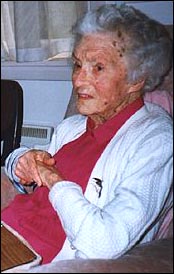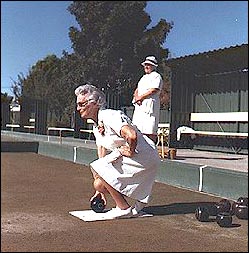– Dorothy – 12/6/97
102 years of adjusting to change – a remarkable Christchurch woman celebrates her 102nd birthday

|
| Eileen at her 102nd birthday party |
Eileen McDavitt was born in New Zealand on April 1 1895 – when Victoria was queen of England, when New Zealand was a British colony, when horse drawn vehicles travelled the New Zealand roads, and the services of the Catholic Church were all in Latin.
Eileen’s grandfather was a tailor by trade, an Irishman who had gone to Australia to the goldfields of Bendigo where Eileen’s father was born. The family then came to New Zealand and settled in Greymouth on the West Coast of the South Island. Eileen’s father became a lawyer and settled in the North Island town of Stratford where Eileen and her brothers were born.
Her first major change When Eileen was seven she had to face the first traumatic change – her mother died. She and her younger brother were sent to live with her aunt in Christchurch. This meant a train journey to Wellington and then an overnight trip on the ferry to Christchurch. Ninety five years later Eileen still remembers walking into a lamp post in Wellington – a little motherless girl uprooted from home and too saddened to watch where she was going.
Meeting New Zealand’s Prime Minister Her aunt was keenly interested and involved in politics and while in Wellington she took Eileen to meet the Prime Minister, the Hon. Richard Seddon. Eileen’s memory of the occasion was that she felt very small beside this big man and very much in awe of him.
Politicians She has lived through many changes of government, but believes that Richard John Seddon, Joseph Savage, Peter Fraser and Walter Nash were our finest leaders because they were more aware of the people they represented, whereas now she believes politicians are aloof and above public feeling.
Life in Christchurch In Christchurch she lived with her aunt and uncle in a house beside the Avon River in what is now the centre of the city. She remembers playing in the garden. A favourite game was Diabolo. When her father came to Christchurch in the Christmas holidays holidays he took her and her brother to the circus and canoeing on the Avon. Canoeing continues to be an attraction for New Zealanders and the same boatsheds remain – built in 1882.
Changes in transport Her grandmother would take her for trips to the beach at Sumner and she would climb up Cave Rock. She went first by horse-drawn tram, then the steam tram and finally in an electric tram.
She spent a holiday with her relatives in Greymouth, and travelled there by the old Cobb and Co coach. She well remembers the passengers having to get out and walk when the roads were steep while the six horses strained to get the coach up the hill.
Her longing for travel took her to Canada, U.S.A., Britain, Hawaii, Japan and Australia, much of the travel being in her years of retirement. She travelled by steamship, train, bus and aeroplane.
Education For a time Eileen attended the Normal School, a building which had been designed in England. The plans had not been adjusted to suit the Southern Hemisphere, so the corridors were sunny and the classrooms were cold. Then she attended a Catholic school.
She was one of the fortunate girls who had secondary education, a privilege enjoyed by only a few girls at that time. She attended West Christchurch High School, now known as Hagley High School. She made the best of this opportunity and was always ready to try new experiences. Her strongest memory was of winning the diving competition. She still has the prize she won. She describes her bathing dress as ‘long and covering most of her’.
Her uncle was a Quaker, but he did not let this affect Eileen’s life. She had lessons in music, singing and speech.
When Eileen was at school the teaching was formal and there were strict standards of discipline. She believes that with less training in discipline there is less goodness in society. She also believes that a lot of speech, even on the radio, is too casual and slipshod. Too few people have had a training in grammar, so they do not express their ideas clearly.
A different home and more singing Eileen’s aunt had health problems so she moved to live with another aunt in Christchurch. Eileen was now singing at picture shows, on the radio and on Sunday night concerts, and her aunt went with her every time even if it was raining or snowing.
She joined the Christchurch Operatic Society and appeared in many shows including ‘Our Miss Gibbs’ and ‘Country Girl’. For one show she was cast for a lead role and then the producer decided that she was too tall for a Japanese girl. The chorus went on strike and refused to audition against her, so they brought a singer from Dunedin who had already sung the part – a disappointment which Eileen still feels keenly today!
Work in the business world – changing countries After training at Digby’s Commercial College Eileen worked at Pyne Gould Guinness where she became the manager’s secretary. Wanting to see more of the world she took three months leave and visited family in Australia. The three months expanded into seven years working there. When she returned New Zealand was in the grip of the Depression of the thirties with high unemployment. However, when she got off the train at the railway station she met one of the managers of Pyne Gould Guinness and was immediately offered a job as a typist. She stayed there for the rest of her working years.
Changing to retirement Retiring was not a difficult change for Eileen because of her many interests and skills. It is fortunate that she has enjoyed being retired, because her retirement has lasted half a century. She was retired when she went to England for the coronation of Queen Elizabeth II.
She joined the Overseas League, played bridge and mahjong, was a keen gardener, and an enthusiastic bowler. I remember her telling me when she was ninety five that she did prefer full-day tournaments to ‘silly little half-day tournaments.’
 |
| Eileen at 95 on the bowling green |
When she was sixty six she became secretary of the Association of Teachers of Speech and Drama – a most efficient secretary and very dedicated to maintaining liaison with members. She continued with this work until she was nearly ninety. Her particular friend among the teachers, Kay Scrivener, put on an annual concert with her pupils and Eileeen played a role in one of the plays each year until she was ninety eight.
Eileen lived in her own flat and drove her own car until she was 95. Since then she has been in residential care and been a lively member of the community, not afraid to express her views. She has not forgotten her father’s advice – ‘Never mind what anyone else says or thinks. You do what is right.’
World Wars Eileen has seen New Zealand men march off to two wars and only some return. She prays for world peace that this may not happen again.
What does Eileen think are the secrets of her longevity? Food She puts her longevity down in part to the plain food she has eaten over the years – home grown vegetables, very little tinned food, and nourishing desserts, like steamed puddings. She does not approve of the takeaways and rich food many people eat now.
Bowls, booze and bridge She explains this as exercise, nourishment and intellectual stimulation.
Her independent lifestyle She has always made her own decisions and has never had a man to consider!
Religion She is still a devoted member of the Catholic Church and attends Mass unless she is ill. It was always her rule that if she was able to go to bowls she was able to go to church. She does not know why God is keeping her here but believes that He must have a purpose.
People Making Changes Main Page




